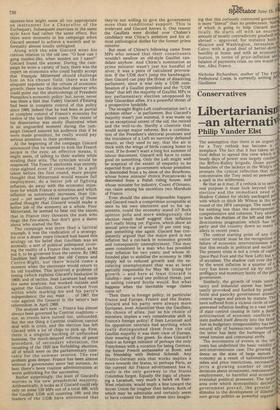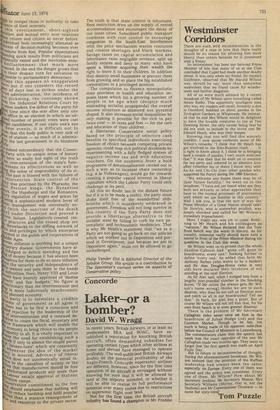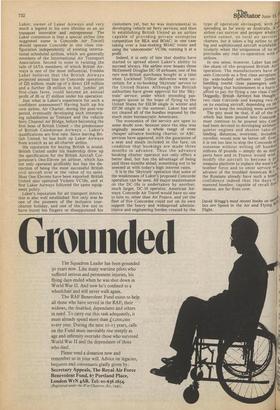Conservatives
Libertarianis -an alternati*
Philip Vander Elst
The assumption that there is an urgent 11 for a Tory rethink has become a c°, monplace. The fact that it has taken an toral defeat to spread this view which in, heady days of power was largely confine' the Biffen-Ridley brigade, those perell..11 headaches of the lackeys in the Whip's oul, prompts the cynical reflection that concentrates the Tory mind so powerfullY a spell in the wilderness.
Be that as it may, if a rethink is to serve real purpose it must look beyond the c election and the immediate need of. Shadow Cabinet for slickly packaged poll with which to ditch Mr Wilson in the S. round of the 1974 campaign. The need Osl for nothing less than the development comprehensive and coherent Tory alterna to both the etatism of the left and the ste directionless pragmatism which has leduli party and the country down so manY " alleys in recent years. The central starting point of any CO vative 'rethink' must be the recognition Of failure of economic interventionism No° that this entails in political and social.tei The present crisis is not a crisis of capita (pace Paul Foot and the New Left) but a c, of socialism. The shadow cast over the fal by the worst inflation in a quarter of a., tury has been conjured up by the 1,1' profligacy and monetary laxity of the prey government.
Similarly, the growth of trade union tancy and industrial unrest has been c tantly provoked and fuelled by predict!, futile and panicky government attemPy control wages and prices by statute. Th115 have suffered from a vicious circle of cen generated inflation leading to a vast extefi of state control causing in turn a dange politicisation of economic conflicts as state pushed itself directly into the firing Just as budgetary irresponsibility has beer' natural ally of bureaucratic interference' the latter has been the harbinger of he tened tension and communal strife. The movements of events in the lastf years has underlined the basic validity .anti-interventionist case. The growing def dence on the state of large sectors cs economy as a result of nationalisation, sidies and price restrictions, necessarilYt jects a growing number of imp.or decisions about investment, remuneratioilc employment, to harmful and econosil, irrational political pressures. The large's area oVer which monopolistic decis10,11 government prevail, the greater 1,5 stimulus to the development of illibera' , sure group politics as powerful organisa' e to compel those in authority to take ance of their interests.
this environment, short-sighted
alism and mutual envy sour relations ,eeri citizen and citizen as never before. individual feels increasingly alienated as Process of decision-making becomes ever
remote from him. Popular expectations taining quick results from politicians are
istically raised and the inevitable ensudisillusionment that much more °unced. In the end the danger grows that al their despair turn for salvation to hostile to parliamentary democracy. haps this appears an exaggerated ialrio but if one considers the record ;er of days lost in strikes under the 'Nis administration, the incidence of picketing, the contempt shown ras the Industrial Relations Court by anion leaders, tile defeat of the party for st time since the war after only one la office in an election in which an uneled number of protest votes were cast
nge candidates; if one casts one's eye
these events, it is difficult not to tie that the body politic is very sick of it of statism — so much of it adminisbY the last government in its blindness Ii indeed extraordinary that the Conser party with its unique sense of history thhave so easily lost sight of the truth over-extension of the state's func-.'essens its effectiveness as well as g the sense of responsibility of its ci.The past is littered with the failures of ()intervention. State control of the enlY was practised by the Pharaohs, the nt Persian kings, the Byzantine tnors, the Hapsburgs and the Romanovs. brY regulation of wages and prices far e,ing a sophisticated modern lever of 4 :PC management was universally en, (with the sanction of the death LY) under Diocletian and proved a °us failure. Legislatively-created res e practices and the closed shop are
throwbacks to the stifling network of
and privileges by which enterprise c.ttered in the guilds and corporations of lddle Ages. eWiSe, inflation is anything but a unique .Porary disease. Governments have alniadolged in deficit spending and the 4 of money because it has always been
geous for them to do so since inflation Ys the security and independence of
Y owners and puts them in the hands lithorities. Nero, Henry VIII and Louis uld have heartily approved of 'dashes r.Wth' and 'fair budgets.' No figure is hi'actionary than the interventionist and thg is more ludicrously anachronistic the Planned economy. ae Party is to formulate a credible .rilhline of government as all agree it gp ere has to be first a conscious and leci rejection by the leadership of the auf interventionism and a renewed detit,•.iorl to create the fiscal, monetary and tt "e framework which will enable the ,vconomy to bring choice to the people a'ss,Perity to all. It is vitally important to
'se the need for establishing such a ork •
of „ if only to silence the stupid parrot ,aissez-faire which are constantly rnwnenever the idea of the market itliY is mooted, Advocacy of liberal hp does not automatically entail into the casualties of society or the Ii 0 that manufacturers should be free 1..uulterated products any more than trabour entails approval of Stalinist "ntion camps. aervative commitment to the free Should emphasise that nothing will ioto reduce hardship and fulfil popular iv,„ns than a massive reassignment of and resources to the private sector.
The truth is that state control is inhumane. Rent restriction dries up the supply of rented accommodation and encourages the decay of our inner cities. Subsidised public transport combines with rent control to encourage congestion in the South-East. Interference with the price mechanism wastes resources and creates shortages and black markets. Savage taxes on capital accumulation and inheritance raise negligible revenue, split up family estates and deny to many who have spent a lifetime acquiring their wealth the right to leave it to their children. In addition they destroy small businesses or prevent them from growing and so place the big established corporations in a privileged position.
The compulsion to finance monopolistic state provision in health and education imposes taxes which hit a growing number of people in an age when (despite much misleading socialist propaganda) the overall income structure is diamond not pyramid shaped. It also increases social inequalities by only making it possible for the rich to pay twice over — in taxes and fees — for the care and education of their children.
A libertarian Conservative social policy based on the principle of selective cash benefits to specified individuals exercising freedom of choice between competing private agencies, could reap rich political dividends by experimenting with a fully fledged system of negative income tax and with education vouchers. On the economic front a bold programme of denationalisation carried out in such a way as to increase share ownership (e.g. a la Volkswagen), would go far towards creating a popular vested interest in liberal capitalism which the Labour Party could only challenge at its peril.
All this no doubt lies in the distant future but if it is to be made a reality, the party must shake itself free of the neanderthal shibboleths which it mistakenly embraced in government. Freedom will not long survive in this country if the Tory Party does not provide a libertarian alternative to the socialist state by failing to curb its own paternalistic and technocratic tendencies. That is why Mr Heath's statement that "we as a Party are not going to go back on our policies which we worked out in Opposition and pursued in Government, just because we are in Opposition again," must not be allowed to go unchallenged.
Philip Vander Elst is Editorial Director of the Selsdon Group. His article is a contribution to The Spectator's current series on aspects of Conservative policy
Concorde
Laker--or a bomber?
David W. Wragg
In recent years, British Airways, or at least its predecessors BEA and BOAC, have established a reputation for knocking British aircraft, often demanding subsidies for operating certain types which other airlines at home and abroad have managed to operate profitably. The well-publicised British Airways doubts on the potential profitability of the Anglo-French Concorde supersonic airliner are different, however, since for the first time operation of an aircraft is envisaged without knowing for sure that it will be allowed to land at the airports intended, or whether it will be able to realise its full performance potential over many routes due to restrictions
• on supersonic flight over land.
Not for the first time, the British aircraft industry has found a champion in Mr Freddie
Laker, owner of Laker Airways and very much a legend in his own lifetime as an air transport innovator and entrepreneur. The Laker contention is that a special airline (the suggested name is Concorde Air Travel) should operate Concorde in one class configuration independently of existing international scheduled airlines, which are generally members of the International Air Transport Association. Second to none in twisting the tails of IATA members, of which British Airways is one of the most influential, Freddie Laker believes that the British Airways projected annual loss on Concorde operation of £25 million, made up of a direct £16 million and a further E9 million in lost 'jumbo' jet first-class fares, could become an annual profit of £6 or £7 million under his operation.
Just what is Laker's experience for such a confident assessment? Having built up his own airline, Air Charter, during the post-war period, eventually developing such enterprising subsidiaries as Transair and the vehicle ferry Channel Air Bridge, before becoming the first boss of British United — the predecessor of British Caledonian Airways — Laker's qualifications are first rate. Since leaving British United, he has built up Laker Airways from scratch as an all-charter airline.
His reputation for buying British is sound. British United under his leadership drew up the specification for the British Aircraft Corporation's One-Eleven jet airliner, which has not only operated profitably but has the distinction of being the most successful British civil aircraft ever in the value of its sales. Most One-Elevens have been exported. British United also operated Vickers VC10s, and at first Laker Airways followed the same equipment policy.
Laker's reputation for air transport innovation is also well established. Not only was he one of the pioneers of the inclusive tourcharter holiday, and one of the few not to have burnt his fingers or disappointed his
customers yet, but he was instrumental in developing vehicle air ferry services, and then in establishing British United as an airline capable of providing private enterprise competition for BEA and BOAC; in one case taking over a loss-making BOAC route and using the 'uneconomic' VC10s, running it at a profit.
Indeed, it is only of late that doubts have started to spread about Laker's ability to succeed always. His airline now boasts three McDonnell Douglas DC-10 airbuses, one of his rare non-British purchases bought at a time when Lockheed TriStar deliveries were uncertain, for a no-booking 'Skytrain' service to the United,States. Although the British authorities have given approval for the 'Skytrain' service, under which intending passengers queue in the hope of flying to the United States for £32.50 single in winter and £37.50 single in the summer, Laker has still not cleared all of the hurdles imposed by the much more bureaucratic Americans.
The economics of the service are open to some doubt now, because since the idea was originally mooted a whole range of even cheaper advance booking charter, or ABC, services have appeared, with the guarantee of a seat and meals included in the fare, on condition that bookings are made three months in advance. Thus the advance booking charter operator not only offers a better deal, but has the advantage of being paid three months ahead, something not to be sneezed at with today's high interest rates.
It is in the 'Skytrain' operation that some of the weaknesses of Laker's proposed Concorde operation can be seen. All major maintenance on the DC-10s is undertaken by another, much larger, DC-10 operator, American Airways. Concorde Air Travel would have no one to turn to, other than Air France, and yet the fleet of five Concordes could not on its own support the heavy and widespread administrative and engineering burden created by the
type of operation envisaged, with rc0 spreading as far away as Australia. A 9 airline can survive and prosper where a airline cannot, on local air services° charters, but it takes a big airline to ope big and sophisticated aircraft worldwide, ticularly when the uniqueness of its sir, precludes any real co-operation with 0' airlines.
In one sense, however, Laker has esr. the sham of the proposed British AO: operation. The manufacturers have 0`. seen Concorde as a first class aeroplane,' ° the wide-bodied airbuses and 'jumbo handling tourist class passengers onlY. logic being that businessmen in a hurry afford to pay for flying a one class Colic, Doggedly, British Airways has thought ' two class Corcorde and keeping two dB', on its existing aircraft, depending on the payer to keep the resulting mess airborne The pity must be that, if all of the 01° which has been poured into Concorde, must continue to be poured into Conc, had been devoted to developing airliners; quieter engines and shorter take-aft landing distances, everyone, including, traveller, would now be better off. Even it is not too late to stop the Concorde sil.„ nonsense without writing off hundrew millions Of pounds — simply do as manY perts here and in France would wish', modify the aircraft to become a weapons platform to replace the west's ago bomber force and to enter service WC advance of the troubled American B-1.4 the Russians already have such a bony, confidence indeed that the days 0° manned bomber, capable of recall fronl mission, are far from over.
David Wragg's most recent books on nen tics are Speed in the Air and Flying Flight.




































 Previous page
Previous page